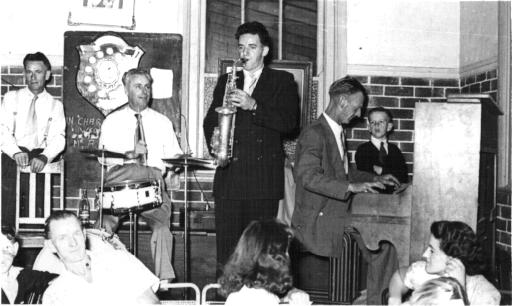|
|
|
| Looking Back | |
|
PUB YARNS & TALES |
||||
 Pub and Club Entertainment The region's pubs were the principle venues for entertainment early this century. From simple singalongs between coal miners at the bar, to paid musos belting out favourite songs of the era on the piano, the pub was the place to be entertained prior to the popualrity of licensed clubs in the 1960s. Some "localised scribble" in the late 1990s from an anonymous 77-year-old correspondent recalls the days of the pub entertainer at Bellambi Hotel in the 1940s. "I have been living here, near the hotel for over 50 years and remember a young man entertaining customers at the hotel every Saturday. There was lots of singing between the radio broadcasting of horse racing, while the bookies were taking bets. The bookies were always keeping a watchful eye for police raids." The Piano player, named "Ted", lived nearby and he was paid by the publican with a bottomless mug of beer, which always sat in arm length on his trusty instrument. Ted used to play in Sydney for the Soldiers during the war before they left for Europe. "Oh how the miners loved the old time songs, a lot of singing and dancing till closing time at 6pm." With the rise in popularity of licensed clubs in the 1960s new venues were built to accommodate the entertainment needs of the people of the northern suburbs. Pubs were replaced by clubs during the 1960s as places to be entertained on weekends. PICTURE: Ron Muir (on sax) and James "Double" Orvad (piano) entertain the crowd at Woonona Bulli RSL. Stately Grieve and the Harp Hotel
Pub Fights
|
Quack Quack
In the latter years of the depression, my father Ernie and his younger brother Ron Swan, came up with an idea to make a few bob by oranising a raffle with a duck as the prize. The problem for the enterprising Swan brothers was, that whilst having the initiative to oranise the raffle and some raffle tickets, neither their fiances nor intentions extended to providing the lucky winner with a duck of the feathered variety. The winning ticket was held by Mrs Luscombe who, with her husband operated the Bulli Family Hotel. The ever resourceful brothers obtained a crate used by the local shop keeper to transport breakables and wheeled it, with Ron inside, to the hotel. Mts Luscombe was then presented with her prize "Duck Swan", a nick-name that Ron (Uncle Duck) carried proudly till his untimely passing. -Contributed by Barry Swan.  The Old Village Pub I sat in the far western corner, To stay just out of their call, And observe the town fold around me, Like a fly sitting on the wall The wrinkled old man was just swaying, As he sung right into his beer, His words a jumbled concoction, Of events from yesteryear. He talked of mates in the coal mine, When trapped they fought for their life, And his friend who died right beside him, And the way he consoled his mate's wife. The pain of his life was written, On a face etched deeply with age, As he talked to himself at the bar, He was using his glass for a stage. Depressed as I turned from the old man, A scuffle rang out in the joint, As I cringed back into my corner, I saw the boys from the Point. They assembled just in the doorway, A mean looking mob as they stood, The rest of the patrons were silent, I'm sure they would leave if they could. The boys from the Point are a legend, In a town where first names are used, Some say you don't even look sideways, For fear you might be abused. As I look around the bar its apparent, This town has its memories, of course, Look closer and you'll see the remnants, Of a rail where they tied their horse. A pub in the middle of Bulli, Sole entertainment for young and old, A place to share their stories, And keep them out of the cold. This ritual has lasted a century, A congregation of friend and foe, What keeps them here together? Have they nowhere else to go? It seems this pub has a spirit, Not only found in a glass, In the bricks and mortar that built it, Are secrets of Bulli's past. -Liz |
|||